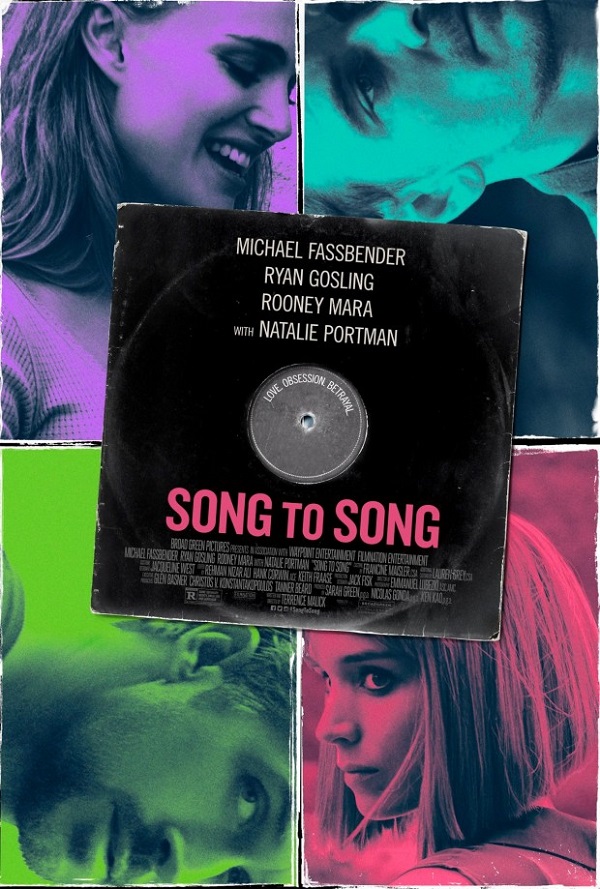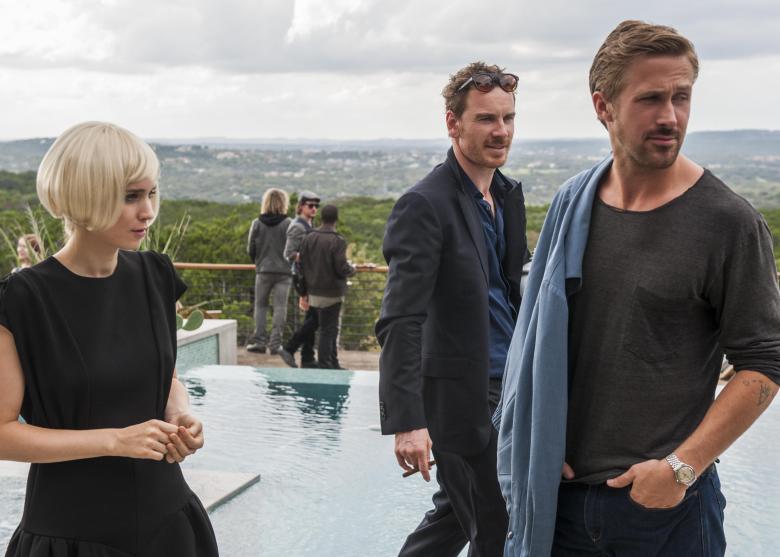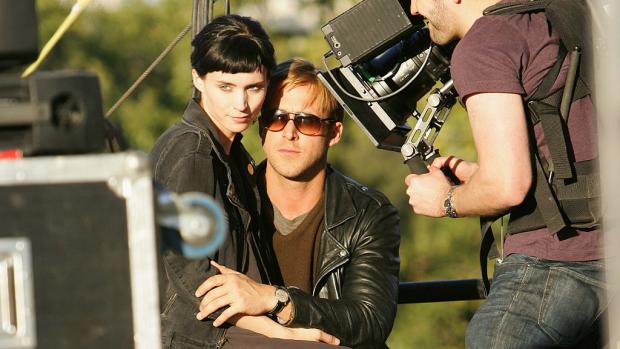Review: Song to Song
 Tuesday, March 21, 2017 at 12:33PM
Tuesday, March 21, 2017 at 12:33PM By Eric Blume
 It’s difficult to review Song to Song, the latest film from Terrence Malick, because based on the standards of cinema (plot, characters, structure, acting, etc.), it’s a pretty terrible movie. But with this film, Malick continues his journey to discover some sort of new cinematic language and style that has a weird beauty all its own.
It’s difficult to review Song to Song, the latest film from Terrence Malick, because based on the standards of cinema (plot, characters, structure, acting, etc.), it’s a pretty terrible movie. But with this film, Malick continues his journey to discover some sort of new cinematic language and style that has a weird beauty all its own.
The story, such as it is, revolves around three people in the music business (played by Michael Fassbender, Rooney Mara, and Ryan Gosling). They go in and out of relationships with each other and a few other folks (notably Natalie Portman, Cate Blanchett, and Bond girl Berenice Marlohe). Malick gives you no real sense of time, so it’s never 100% clear what happens when exactly. But there are many, many scenes with those five people running their hands over each others’ bodies while voiceover proclaims banalities about sex and connection...
Your tolerance for this approach can probably be judged by your overall feelings about Tree of Life. In that film, Malick combined traditional scenes (kitchen-sink type stuff with Brad Pitt and his boys) with esoteric mediations on the life cycle where we’d see endless images of Jessica Chastain in wheat fields. In Song to Song, Malick eschews all traditional scenes: there’s barely one real, sustained scene in the picture. Instead, he performs an admittedly elegant technique where he uses a combination of sound bridges and jump cuts to touch upon one or two elements of the scene to give you a glimpse of the characters’ relationships. My guess is that he had the actors improvise endlessly, and then in the edit bay he did his infamous slashing to capture just a lingering moment from each. While it’s fun to imagine these huge movie stars seeing this movie for the first time and thinking “damn it, we spent all day doing that scene and now it’s in there for fifteen seconds,” that’s the only joy to be derived from this style. We never get a sense of who the characters are, what their real connection is to each other, etc. There’s no depth, and no shaped drama. While I realize that is the point, you don’t feel anything: Malick has several of cinema’s greatest actors at his disposal, and even they can’t make you care about who they’re playing.

While Malick’s method feels ponderous and a bit pretentious, it also yields several beautiful images. His collaboration with Emmanuel Lubezki here results in a constantly-roaming camera that picks up lovely small details, and in the few brief scenes in the film, they avoid the standard shot/reverse shot language in a way that keeps the movie fluid and alive. But what they can’t capture is any kind of dreamy tension, like David Lynch delivers when he goes more “experimental”. After about twenty minutes, the monotonous pace becomes insurmountable, and there’s still almost two more hours to go at that point.
The male actors come off stronger than the women. If anything, this film serves as an excellent time capsule for seizing Fassbender and Gosling’s immense charm, charisma, and beauty. They’re at the peak of their powers as movie stars, and they help propel the film and sustain some sense of interest. Mara has estimable skill, but she’s not exactly known for her warmth, and her character remains at a distance. You know the actress is in deep with her character, but she’s unable to translate any tangible sense of her arc to the audience.
The entire way the women are costumed and shot in this movie seems somewhat creepy-old-man-like. Portman is dressed in a series of absurdly tight, low-cut sweaters and booty-hugging jean shorts, and when Mara enters a relationship with Marlohe, the film enters a truly weird, gauzy universe that borders on softcore porn. On some level, Song to Song is about sex (I think), but Malick treats the sex in the film both with kid gloves and a complete lack of eroticism. There’s a lot of touching in the movie that after a while borders on a parody of modern dance…it’s truly bizarre!

Song to Song is a tough movie. You see Malick’s beauty as an artist, and you want to pull for him for trying something new and interesting. But he doesn’t make it easy for you, and it’s difficult to imagine people connecting with the film.



Reader Comments (19)
I know it's cinephile heresy to criticize Malick but this man is in desperate need of a screenwriter and has been for a long time.
If that's the explicit thesis of the review, there's not much point in reading further, is there? Malick's never really been all that interested in the standards of mainstream, traditional cinema.
Another take, which makes me want to see the film sooner than later: http://www.slantmagazine.com/film/review/song-to-song
Malick continues his journey to discover some sort of new cinematic language and style that has a weird beauty all its own.
Those who make excuses for Malick are forbidden from using the word pretentious to describe anything in all of humanity.
O if only Fassbender and Gosling were running their hands over each other's bodies.
I have to agree with Paul Outlaw that the first sentence of this review basically disqualifies the writer of any credibility.
Sigh, I was hoping against hope this would be something I'd want to see. The music angle, in particular, intrigued me, not to mention that cast. But I don't think I can take much more whispery pseudo-profound voice-over and canonization of the eternal feminine, or whatever
It's weird, though - I absolutely adore Tree of Life. Loved it more than The Thin Red Line, or The New World, even while acknowledging (and half-apologizing to others) that it reached new excesses of Malickian self-indulgence. But "To the Wonder" did not work for me at all, and nothing I heard about "Knight of Cups" made me want to see it. Afraid that this one falls in the same category as the latter.
Um, you people need to lay off. Conceding that it's a tough work to pin down does not disqualify someone from writing about it. Have all the IMDb trolls migrated to the Film Experience lately since their boards got shut down?
I do not get the complaints on Malick. Yeah his movies are "difficult" but at least he's trying something new. I'd rather sit to any of his movies than the ton of bullshit cinema that comes out all year long. Lets talk 20 years from now when The Tree of Life and Knight of Cups will be considered masterpieces. Oh wait, the former already is
This film is just so captivating. Malick's best work in a while in my opinion. The structure can be challenging at times, but it gave me the type of visceral experience very few filmmakers failed to do. I understand that this is not a film for everyone, but I would watch this over some of the most praised films of the year any day.
Eros I like the way you think...a Fassbinder/Gosling love scene would be hot
I still want to see it. It's Malick. I'll take mediocre Malick over anything else.
Anon, thank you for getting it and the kind words.
I saw the trailer for this and it does look very pretty but all of Malick's films are beautiful to look at- Gosling and Fassbender do look great together
I'm with Christopher Plummer on Malick: https://www.youtube.com/watch?v=xw08GQw0hBI
Malick may indeed revolutionize cinema, but there are other revolutions happening now, and they do it far more concisely and effectively. I'll watch and join those revolutions instead.
I think it's weird that people who are complaining about the first sentence ignores the very next word "But".
Also, I apologize for not taking longer to think of a better analogy, BUT why should we give free passes Malick for "trying something new"? (Here's the offensive analogy) Trump is trying something new everyday with his presidency but it doesn't mean he is doing a good job. You can try new things and still not be considered "good".
Anyways, I thought the review summarize everything nicely. I guess at this point, either you are with Malick or you are not. No need to argue too much either way.
Eric, you put your review in context quite nicely. Well-done. Malick has great talent but he's far from infallible.
I am a Malick devotee and admit that there's something "off" about his last two films. However, my initial distaste for To the Wonder turned into a desire to understand, since I do like his past works so much. I mean, all five of his major masterpieces are in my top 100. That's an incredible track record.
I notice his films really work when they're period, but when Malick goes contemporary, there's a disconnect. But I began to appreciate To the Wonder and Knight of Cups more when I viewed them as deeply personal and reflective of the man himself, or of how he sees himself in relation to others and to American culture. These films seem as reclusive and distant as the mythologized version of Malick.
That being said, I'm not sure I will ever love this formless trilogy of his in the way that I love the rest of his movies, but I can't help but be fascinated by the way Malick sees the world, no matter the subject. He can be off-putting at times, but I'll always be there on opening night.
I also just have to say that, for me, the opening of Knight of Cups might have been the single best moment in cinema last year. Maybe Malick should think about shorter pieces when he goes experimental?
One more thing: I actually felt a lot re-watching To the Wonder in preparation for Knight of Cups, and then during Knight of Cups, but what I felt were not things I've felt in his other movies, or most movies. I guess it felt more like video art to me than cinema, like it would be better received if it were playing on loop in a museum.
I count myself as a Malick acolyte but I also maintain a critical distance in my appreciation of his films. I still like to enjoy great moments of cinema in a film even if the film itself is far from perfect in my very subjective view.
Like David S., I try to understand his films as a whole, the symmetry, the shape, the texture and the beautifully framed shots but his recent ones do not conform to the perfect shape I am looking for in a film. It's tough to get the rhythm of his films: the pace, dialogues (or lack of), the time-image fetish presented by extreme close-ups of leaves of grass, etc. I am not sure I got his films but the film language he "speaks" is mysterious and I am intrigued to learn parts of it. So, while I love his older films (his recent ones, not so much), I am still eagerly awaiting to see Song to Song knowing that I may not like it initially. Is he pretentious? Maybe. But even labels like that are still social constructions, no? Like "poetic" and "sublime" and "tedious" and "a misfire".
Love the line that Joseph (Brian Dennehy) said in Knight of Cups: "You think when you reach a certain age things will start making sense, and you find out that you are just as lost as you were before."